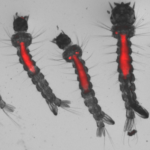Link to Pubmed [PMID] – 29558973
Link to DOI – 10.1186/s13071-018-2784-x
Parasit Vectors 2018 03; 11(1): 200
The microbiota of Anopheles mosquitoes interferes with mosquito infection by Plasmodium and influences mosquito fitness, therefore affecting vectorial capacity. This natural barrier to malaria transmission has been regarded with growing interest in the last 20 years, as it may be a source of new transmission-blocking strategies. The last decade has seen tremendous progress in the functional characterisation of the tripartite interactions between the mosquito, its microbiota and Plasmodium parasites. In this review, we provide insights into the effects of the mosquito microbiota on Plasmodium infection and on mosquito physiology, and on how these aspects together influence vectorial capacity. We also discuss three current challenges in the field, namely the need for a more relevant microbiota composition in experimental mosquitoes involved in vector biology studies, for a better characterisation of the non-bacterial microbiota, and for further functional studies of the microbiota present outside the gut.

